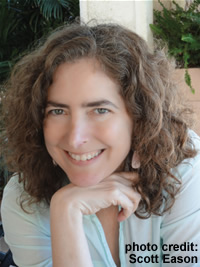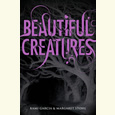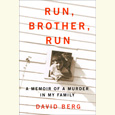Runaway
In Diana Abu-Jaber’s new novel, a teen leaves home for no reason—and upends her family’s future
I devoured Birds of Paradise in two sittings, and if such a thing were possible with books, I would have licked the plate. Diana Abu-Jaber possesses a staggering ability to bring characters—and the reader’s attention—to life. The novel is structured like literary Chinese handcuffs: no character in this book can be free without first moving closer to the others, and no reader can finish it without looping backwards, too, through her own history. Abu-Jaber just totally gets the hell of seventh grade—and the equal hell of raising a teenager.
In the end, this is a novel about longing and loss. In Birds of Paradise, Brian and Avis have a son, Stan, now in his twenties, and a daughter, Felice, who left from home at thirteen. In the five years since, Avis, a gourmet pastry chef, has seen her daughter only eight times, though they all still live in Miami. Felice has never explained why she ran away; one morning she simply packed a cosmetic bag, sunscreen, bottled water, a sweater, and walked out the door. She’d bolted before, only to be returned by the police. After one of these episodes, Avis remembers, Brian spanked the girl, “the gesture so furious and despairing” it merely proved to Avis “how ineffectual they were. Felice had started leaving them already: neither one knew how to stop it, neither knew why it was happening.” Eventually Avis and Brian, frustrated to the point of despair, admit to themselves that they cannot make their daughter stay. And one morning—following a period of depression characterized by what looks like absolutely typical teen behavior: “willful recalcitrance, bouts of spoiled, pettish behavior”—she is gone.
 The book opens as Avis attempts, yet again, to meet Felice at a time and place of Felice’s choosing. At the café, Avis waits with a wad of fifties and a box of homemade, labor-intensive chocolate-flake and candied-ginger cookies, Felice’s favorites. Brian, a corporate lawyer, describes the cookies as looking “like something Marie Antoinette would wear around her neck. When she still had one.”
The book opens as Avis attempts, yet again, to meet Felice at a time and place of Felice’s choosing. At the café, Avis waits with a wad of fifties and a box of homemade, labor-intensive chocolate-flake and candied-ginger cookies, Felice’s favorites. Brian, a corporate lawyer, describes the cookies as looking “like something Marie Antoinette would wear around her neck. When she still had one.”
Felice doesn’t show. Avis waits. And waits. Defeated, she snaps at a stranger and drives home to cry in the locked bathroom.
With a third-person-omniscient narrator, Birds of Paradise is comprised of alternating chapters that describe Avis, Felice, Brian, and Stanley. Like pieces of a puzzle—or, in this case, a pie—their stories fit together, creating a family portrait. Abu-Jaber answers the central question behind Felice’s self-ostracization, in the process creating an astute portrayal of muddled teen thinking: Felice hasn’t told anyone what has happened to make her leave home, “believing that telling someone would somehow lighten her self-imposed punishment.” She’s spent her teenage years sleeping on the beach and in an abandoned building, working intermittently as a model, doing drugs, skateboarding, and getting herself into—and narrowly out of—dangerous situations of Jerry Springer-esque proportions.
 The crisis with Felice takes its toll on her parents’ relationship, of course: Brian has a crush on a woman in his office, though he does acknowledge that Avis has remained steadfast in her own way: “It seemed possible in fact … that she really did still love him.” On the surface, their lives are tempered and materially sound, despite the loss of their daughter and their tenuous hold on status. (When Avis overhears a stranger refer to her neighborhood as “the ghetto of the Gables,” she doesn’t understand and receives this explanation: “You know, four bedrooms instead of eight, balconies but no tennis courts, no servants’ quarters. That sort of thing.”) The personal effect of Miami’s centrifugal preoccupation with money is more apparent in Brian’s effort to turn a quick real-estate profit in an effort to acquire the funds to buy the building that houses Stanley’s struggling organic grocery store and help his son stay in business. Meanwhile Avis has says she can’t afford to use Stanley’s ingredients in her own business, further complicating an already tense family climate.
The crisis with Felice takes its toll on her parents’ relationship, of course: Brian has a crush on a woman in his office, though he does acknowledge that Avis has remained steadfast in her own way: “It seemed possible in fact … that she really did still love him.” On the surface, their lives are tempered and materially sound, despite the loss of their daughter and their tenuous hold on status. (When Avis overhears a stranger refer to her neighborhood as “the ghetto of the Gables,” she doesn’t understand and receives this explanation: “You know, four bedrooms instead of eight, balconies but no tennis courts, no servants’ quarters. That sort of thing.”) The personal effect of Miami’s centrifugal preoccupation with money is more apparent in Brian’s effort to turn a quick real-estate profit in an effort to acquire the funds to buy the building that houses Stanley’s struggling organic grocery store and help his son stay in business. Meanwhile Avis has says she can’t afford to use Stanley’s ingredients in her own business, further complicating an already tense family climate.
In subsequent chapters, Felice spends more and more time with a boy, potentially her boyfriend, who explains he ran away because “I just wanted to try living not in a house for a while. Or, well, not in the same house my family was in.” And, really, what teenager hasn’t felt that way? Abu-Jaber’s book illuminates such deceptively simple human hungers: to make amends, to love and be loved, and to have a home. And as the novel unfolds and unforgiving characters crack open with forgiveness, the whole story—in spite of its dark plot—begins to shine.
Diana Abu-Jaber will discuss and sign copies of Birds of Paradise at the Booksellers at Laurelwood in Memphis on September 21 at 6 p.m.


